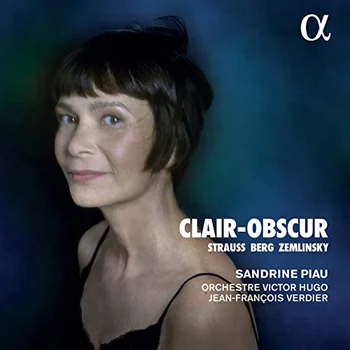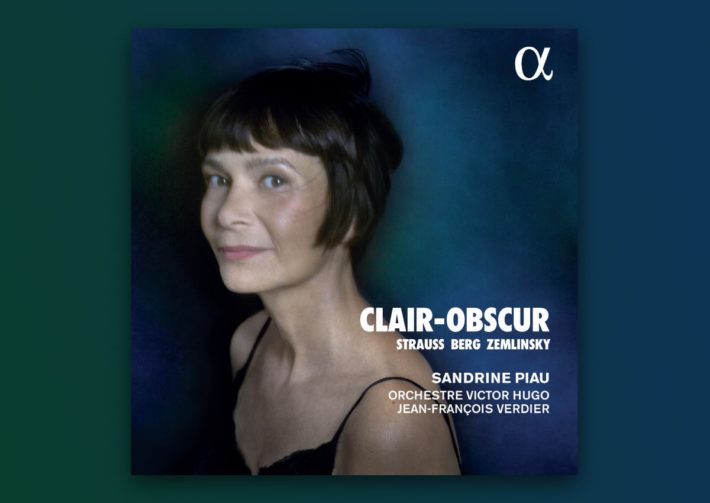What might one expect from an album entitled ‘Clair-Obscur’? Art songs from Debussy, Fauré, or Duparc perhaps with a particularly nocturnal ambiance? The program from soprano Sandrine Piau in her latest Alpha release focuses not on French chanson, but on German, early-to-late twentieth-century Viennese orchestral songs. Not repertoire immediately associated with Piau, who recorded extensively earlier music in recent times. The booklet highlights that she is returning to music she adored in her student years.

Piau opens with a rare recording of Zemlinsky’s “Waldgespräch”. Sadly, this composer’s music is still underrepresented and Piau is commendable for including it. Just marginally faster than Soile Isokoski, Piau and conductor Jean-François Verdier bring an urgency to the music, while Edith Mathis brings a much more sinister hue. Both Isokoski and Mathis have wider vibratos than Piau’s purer tone; they are more intrinsically Straussian and Mahlerian, more akin to Zemlinsky’s music. Mathis especially revels in the more dramatic nature, whereas Piau doesn’t deliver with the same boldness.
Berg’s Seven Early Songs, which are at the center of the album, are again briskly paced, but not excessively so. Piau’s voice and the orchestral colors allow the varied textures of Berg’s writing to shine. Piau is articulate but lacks the same clarity of diction as Isokowski’s performance, though the latter perform with only a piano accompaniment played by Susanna Phillips, in her recent release of the same cycle. The mixing in this newer version, especially with regards to the percussion, is particularly effective, intensifying the emotional impact.
Strauss’ “Four Last Songs” are taken by Piau at a brisker pace than many will be used to. This doesn’t mean they sound hurried in any way and are in terms of pacing more comparable with Isokowski. Whereas Isokowski has a dramatic voice, Piau’s is dexterous and agile. Piau’s approach to the Strauss is simpler, leaner, less expressive than those sopranos such as Lise Davidsen, Renée Fleming, Jessye Norman or Elisabeth Schwarzkopf.
In the first song “Frühling”, Davidsen and Norman navigate the peaks and troughs with greater conviction. Where Piau’s pacing becomes most evident is in the final song, “Im Abendrot”, being one of the quickest performances recorded. Coming in at three minutes less than Norman or a minute less than Isokowski, the same ambiance of tranquillity is not generated. While beautifully performed, the emotional impact of the entire cycle is lessened.
Lise Davidson’s release of the four last songs (which I’ve reviewed here last year) programmed both “Malven” and “Morgen” (Op. 27), which Piau also includes. Davidsen’s approach in “Morgen” is broader than Piau. Davidsen’s more languorous approach finds stillness and warmth, unlike Piau’s cooler interpretation. There is still a real beauty from Piau but the ability to create the same magic is lacking. Davidsen places “Malven” immediately before the four last songs, whereas Piau after. This feels rather misplaced and disjointed. Coming after the Four Last Songs, it breaks the silence prematurely after “Im Abendrot”.
The greatest Strauss singers have a much grander richness in their lower voices, which is characteristic of their dramatic voices. Piau’s more lyrical quality soars beautifully and is technically secure, but occasionally too controlled and less expressive. Davidsen’s peaks and troughs in the undulating phrases are more intrinsic to the music.
Verdier conducts the Orchestre Victor Hugo Franche-Comté, an ensemble that possesses a slimmer than usual sound profile for this repertoire; The booklet lists each orchestra member, and reveals a slightly smaller body of strings, which may account for the greater transparency. The leaner sound does bring some woodwind and brass features to the fore that otherwise are not heard. Together with Piau’s voice, there is remarkable consistency in the aesthetic throughout, but the richness of what many consider the “Straussian sound-world” is strangely lacking. Piau certainly brings something very personal to this repertoire, which makes for an intriguing listen, especially with the cleaner orchestral sound. A curious listen indeed.
Recommended Comparisons
Norman | Janowitz | Isokoski | Schwarzkopf
“Clair-Obscur“
Zemlinsky – “Waldgespräch”
Strauss – Vier Letzte Lieder, Morgen!, Meinem Kinde
Beg – Sieben Fruhe Lieder
Sandrine Piau – Soprano
Orchestre Victor Hugo Franche-Comté
Jean-François Verdier – Conductor
Alpha Classics, CD ALPHA 727



















